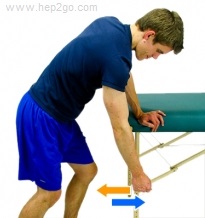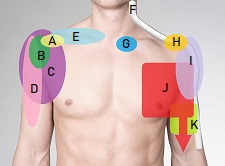- Home
- Shoulder Exercises
Exercises For Shoulder Pain
Written By: Chloe Wilson BSc (Hons) Physiotherapy
Reviewed By: SPE Medical Review Board
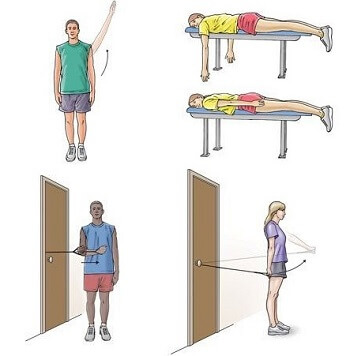
Do exercises for shoulder pain really help? Absolutely! Exercises help to improve the strength, stability, mobility and flexibility of the shoulder to allow full, pain-free movement and helping you get back to the activities you love.
Exercises for shoulder pain help to restore the natural rhythm, strength and motion of the shoulder.
Most causes of shoulder pain, including impingement syndrome, rotator cuff tears, bursitis and tendonitis, all really benefit from doing exercises.
Best Exercises For Shoulder Pain
Different exercises are suitable at different stages of rehab with shoulder problems, depending on the severity and nature of the problem and here you will find a whole range of exercises for shoulder pain:
- Shoulder Mobility Exercises: Perfect for beginners
- Shoulder & Arm Stretches: Improve the flexibility in your shoulder
- Rotator Cuff Exercises: Improve shoulder strength, stability & function
- Theraband Strengthening Exercises: Build strength with resistance bands
- Shoulder Impingement Exercises: for shoulder impingement syndrome
- Scapular Stabilization Exercises: Improve shoulder blade strength
- Frozen Shoulder Exercises: Reduce pain and improve movement/function
- Golfers Elbow Exercise: Reduce strain on the tendon
This guide will help you find the right exercises for shoulder pain for you, will give you guidance on how to perform them correctly, how to progress appropriately and top tips on getting the best results.
1. Shoulder Mobility Exercises
The best place to start with exercises for shoulder pain is with mobility exercises. Mobility exercises for shoulder pain work on regaining free movement at the shoulder by stretching out the structures inside the joint such as the joint capsule as well as the surrounding muscles. They are perfect if your shoulder is feeling stiff and sore to move.
Shoulder problems are often associated with stiffness, leading to pain and/or limiting how much the arm can move. These mobility shoulder rehab exercises help to gently get the arm moving to help loosen the joint up – they are a great place to start.
Who Are They Suitable For?
Anyone wanting to improve their arm and shoulder movements be it after an injury, surgery or anything that has caused the shoulder to stiffen. These mobility exercises for shoulder pain are targeted to those who have lost arm movement and have a stiff shoulder with restricted movement, rather than people who have full or almost movement – arm stretches would be more appropriate there.
Even if it feels like you can’t move your arm at all, these shoulder rehab exercises will help. Visit the shoulder mobility exercises section to find out more.
2. Stretching Exercises For Shoulder Pain
Stretching exercises for shoulder pain, neck and upper back problems can be really helpful. Whether you are looking to
- Improve Shoulder Range Of Motion: to improve function
- Improve Posture: and reduce the pain and stiffness associated with poor posture
- Improve Flexibility: through the shoulder, neck and upper back
- Warm Up/Cool Down: before exercise to ensure the best results and help prevent injuries
Who Are They Suitable For?
Anyone wanting to improve flexibility who does not have an acute shoulder problem – if you do, you need to concentrate on getting the pain from that under control first. I would suggest starting with the shoulder mobility exercises first and come back to these towards the end of your rehab.
For the best stretching exercises for shoulder pain choose from:
- Shoulder & Arm Stretches: Stretch out the rotator cuff muscles, pectorals, biceps, triceps and deltoid muscles to improve arms movements in any direction
- Trapezius Stretches: Stretch out the large trapezius muscle that spans the neck, shoulder and upper back. Tight traps are a very common problem, particularly in people who spend long periods on screens, as are trigger points - trapezius stretches can make a big difference
- Upper Back Stretches: Upper back stiffness often limits shoulder movements. A combination of tightness at the front of the chest and stiffness in the spine affects how the shoulder and shoulder blades move and is a common cause of pain
- Bicep Stretches: Target the important bicep muscles in different positions to stretch the different parts of this important muscle
3. Rotator Cuff Exercises
Rotator cuff exercises for shoulder pain target the group of muscles that surround the shoulder joint and provide both stability and movement of the shoulder. Weakness, tightness and/or damage to the muscles, such as a rotator cuff tear, can change the way the shoulder moves which can lead to problems such as impingement and pain.
A vicious cycle can then develop causing the shoulder to get stiffer and weaker, resulting in more pain. These shoulder rehab exercises work on improving both the strength and mobility of the shoulder.
Who Are They Suitable For?
Everyone! Most cases of shoulder pain will be accompanied by some level of rotator cuff weakness and or tightness. It’s simply a case of working at the right level for you. If you are recovering from an injury such as a rotator cuff tear or surgery such as a subacromial decompression, start with the basic rotator cuff exercises, where you will find a combination of strengthening and stretching exercises for the rotator cuff.
If you are further down the line, or have been getting a few niggles in your shoulder which you want to address before a problem develops, you can try the more challenging rotator cuff exercises for shoulder pain with theraband.
4. Resistance Band Exercises
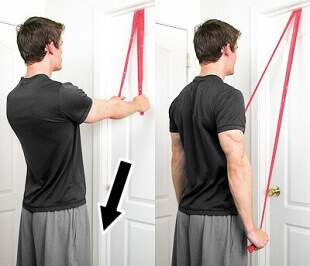
Resistance bands are a really useful tool when it comes to improving the strength and control around the shoulder. They are cheap, easy to use, extremely versatile and really effective. Many people prefer using resistance band to weights.
Resistance band exercises for shoulder pain not only add some variety to your usual exercises, but are an excellent tool for improving function.
Who Are They Suitable For?
You can start using resistance bands with your shoulder rehab exercises, usually between 2-6 weeks following a shoulder injury, once you have mastered the rotator cuff exercises. They are also great if you are looking to improve the strength around your shoulder, even if you don't have any shoulder problems. Visit the Theraband Shoulder Rehab Exercises section to find out more.
5. Shoulder Impingement Exercises
Shoulder impingement syndrome is the most common cause of shoulder and upper arm pain and exercises are a vital part of treatment. With shoulder impingement, narrowing of the subacromial space places pressure and friction on the rotator cuff tendons leading to inflammation and tearing. Impingement syndrome may develop due to bony abormalities or from instability around the shoulder and scapula.
Who Are They Suitable For?
The most classic feature of shoulder impingement syndrome is a painful arc, when the pain is at is worst when your arm is raised around shoulder height, or when twisting the shoulder. Impingement exercises for shoulder pain help to improve strength, stability, mobility and positioning.
6. Scapular Stabilization Exercises
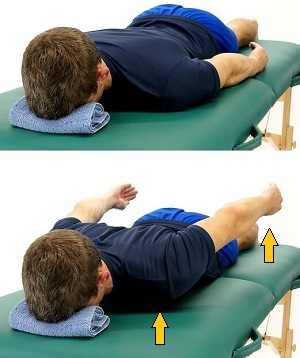
Scapular stabilization exercises for shoulder pain are often forgotten about. Shoulder blade stability is a common problem which can lead to a whole host of shoulder issues. With so much movement available at the shoulder joint, the scapula plays a vital role in controlling all that movement.
If there is weakness in the scapular stabilization muscles then structures in and around the shoulder are prone to damage through tearing and pinching and movement may be restricted.
Who Are They Suitable For?
Scapular stabilizing exercises are useful for almost anyone with shoulder problems, but are frequently forgotten about. They should be done alongside rotator cuff strengthening exercises to ensure your shoulder is both strong and stable so it can function properly. Visit the scapular stabilizing exercises section to find a whole range of stability exercises for shoulder pain, from beginners to advanced.
7. Frozen Shoulder Rehab Exercises
Frozen shoulder aka adhesive capsulitis is a common problem. Pain builds up in the shoulder and movement gets increasingly restricted. This may develop gradually for no obvious cause, or following an injury or surgery.
Gradually, pain levels reduce but the stiffness can persist for months before finally settling down. Doing frozen shoulder rehab exercises regularly can really help reduce stiffness and pain and can help reduce the recovery time.
Who Are They Suitable For?
Anyone suffering from a frozen shoulder, whatever stage. Those in the painful phase should concentrate on the lower level exercises to keep as much movement and strength as they can, whereas those who are in the stiff phase without much pain can work on the stretching and mobility exercises to regain lost movement and strength.
These exercises are also suitable for people recovering from frozen shoulder surgery. With each of these shoulder rehab exercises for frozen shoulder you will find guidance as to when the exercise is appropriate, how it should feel, how to progress and what you are aiming for. Visit the frozen shoulder exercises section to find out more.
8. Golfers Elbow Exercises
Golfers elbow is a common cause of inner elbow pain which can refer pain down the the wrist. Also known as medial epicondylitis, it is commonly caused by repetitive gripping and twisting movements in the forearm.
Golfers elbow typically affects manual workers who spend a lot of their day using tools and athletes who participate in racket or throwing sports.
As it is an overuse injury, it is really important to follow a rehab programme of golfers elbow exercises to make sure you aren't overdoing things or else you can set your recovery back.
Who Are They Suitable For?
People with inner elbow pain that is painful to touch are likely to have golfers elbow. Exercises are one part of the rehab process and should be combined with other treatments such as injections, activity modification and rest. Visit the golfers elbow exercises section for a whole range of exercises that can help and loads of guidance and top tips on how to progress without making things worse!
How Do Shoulder Rehab Exercises Help?
But why and how do shoulder rehab exercises help? The shoulder is the most mobile joint in the whole body, allowing the arm to move large amounts in multiple directions through a complex combination of rolling, gliding, spinning and sliding movements.
It achieves this by the shape of the joint, sacrificing stability for mobility, through having a very shallow socket for the upper arm bone to sit in so as not to hinder arm movement. The shoulder muscle network surrounding the joint is vital to ensure that it remains stable and can move freely.
Anything that interferes with any aspect of this, be it muscle weakness, tightness, bony abnormalities, injury, inflammation or postural changes, can affect shoulder and arm movement and result in pain.
Safety Advice
Before starting exercises for shoulder pain, you should see your doctor. It is really important to find out what the underlying cause of any shoulder pain is to ensure that you get the right treatment.
Shoulder rehab exercises will help in most cases, but they won’t all always be appropriate. So talk to your doctor or physical therapist before starting any new exercises for shoulder pain to make sure they are right for you.
What Else Can Help?
Exercises for shoulder pain are a vital part of the recovery process for almost every case of shoulder pain. The shoulder relies on a good combination of strength, stability and mobility to cope with the demands placed on it each day.
If you want help working out what is causing your shoulder pain, visit the shoulder pain diagnosis section. Alternatively, if you already know what is wrong with your shoulder and are looking for more information on other treatments to use alongside exercises for shoulder pain, visit the common shoulder problems guide.
Page Last Updated: 12/12/2023
Next Review Due: 12/12/2025
